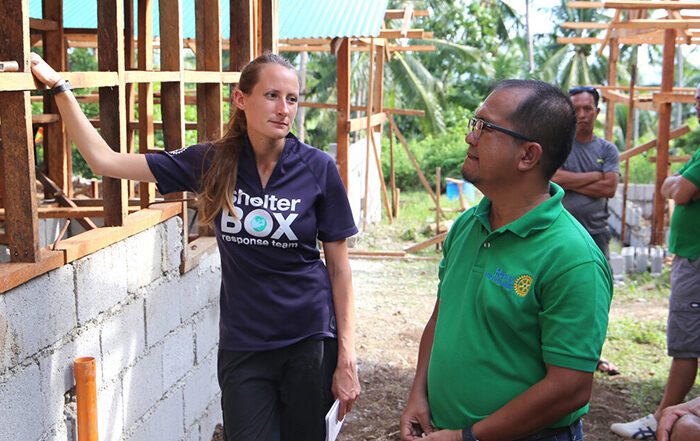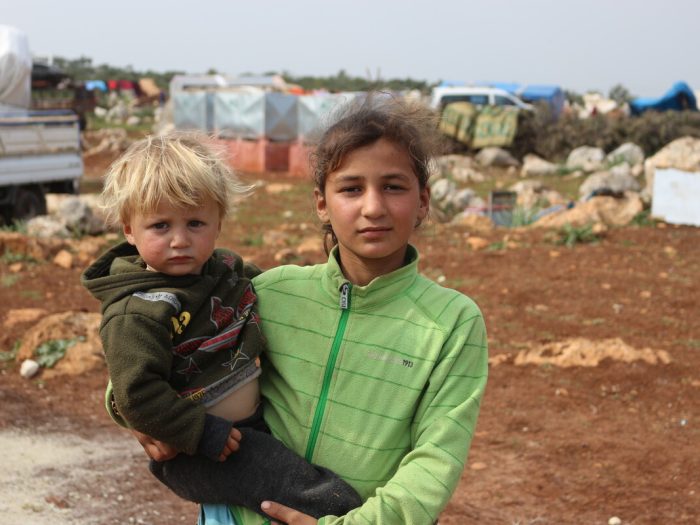
Rotary International partnership
Working in partnership to make a difference worldwide
Working in partnerships is in our DNA. We have always focused on building lasting relationships and powerful partnerships so we can support the people after disaster in a way that is right for them.
Read more about how we make those operational partnerships work, so we can provide families with the essential shelter they need to start recovering from a disaster.


We partner with all kinds of humanitarian and international development organisations, as well as local governments in the places where we’re working. We always make sure that we work with organisations who share our goal to support people who have lost their homes to disaster.
Working in partnership is a key part of our five-year strategy. We believe that humanitarian assistance should be as local as possible and as international as necessary. This means recognising and supporting communities, local and national organisations to lead shelter projects. These groups are the first to respond to a crisis and the last to leave. They are better placed than any international organisation to respond to the needs of their own communities. However, these organisations sometimes lack the resources or infrastructure to deliver projects. We are committed to providing funding and training to support partners in their work. This means they are better prepared and able to deliver more effective work as a result of partnering with us.
By working in partnership, we can increase our reach and provide support to communities in some of the most remote and dangerous conflict zones around the world.
We work with many organisations. From local groups in the countries where we help, to UN agencies and the International Federation of the Red Cross. We choose partners who share our commitment to make sure no one is without shelter after a disaster.
Together, we use our combined skills to help people rebuild their lives. For example, we might provide shelter expertise, and a partner might handle clean water, sanitation, and hygiene items.
Working alone after disasters and during conflicts isn’t effective. We support communities better and faster by teaming up with partners around the world.
Working with others strengthens our work in many ways:
We can reach more people in hard-to-access places, like Gaza.
We can commit to long-term support without setting up local offices.
We learn from local partners and use our resources effectively.
We share our knowledge, like our expertise in safeguarding and shelter, improving how we respond.
Our responses are better suited to each area because they’re designed by local people for local people.
We can act quickly, with local partners starting work as soon as a disaster happens, setting the stage for our teams to build on.
Our partnerships ensure we can pool resources and support people around the world in the most efficient way
ShelterBox began in 2000 as a Cornish Rotary Club’s millennium project.
With the support of Rotary members and clubs around the world, ShelterBox has grown to become an internationally recognised, independent disaster relief organisation. Since 2012, ShelterBox and Rotary International have been official Project Partners in disaster relief.
Whenever disaster strikes, Rotary is beside us – from the earliest planning stages to final evaluations. Our partners help us to make contacts on the ground, organise logistics, and reach people who might otherwise go without.
Each year, Rotary members help us to go further, support more people and access areas that would otherwise be impossible to reach. Read what we achieved in partnership across 2023 here.
ShelterBox is one of the few organisations to have a global cooperation agreement with The International Federation of Red Cross and Red Crescent Societies (IFRC). This unique partnership lets us work closely with them to support humanitarian coordination, shelter innovation and emergency shelter to vulnerable people after disaster.
After many years of successful collaboration, ShelterBox also has a formalised relationship with Habitat for Humanity International.
The agreement guides joint working during disaster responses. ShelterBox focuses on the initial emergency need for shelter after disaster, and Habitat for Humanity looks to the longer term for families and communities.
Our response to the severe monsoon flooding in Pakistan has been in partnership with Islamic Relief Pakistan. Our more recent work together has been focussed on creating more durable shelters. In Yemen we are working with Benevolence Coalition for Humanitarian Relief (BCHR). BCHR have been working in Yemen since 2015 and together with ShelterBox they are providing shelter and essential household items for people that have been internally displaced.
In Syria, we work with two partners, Bahar and Relief Aid to support families affected by the ongoing civil war. The winters are harsh in Syria, with temperatures plummeting below freezing. We supply families with blankets, coats and utensils to cook warm food.
Finally, in Gaza, we are working with our partners Medical Aid for Palestinians (MAP), the Egyptian Red Crescent, and PARC to import vital aid for displaced families.
In Burkina Faso our implementing partner is HELP (Hilfe zur Selbsthilfe), a German NGO. They are supporting thousands of people who have been displaced due to conflict with shelter and household items like pans, water filters and solar lights. Our partner in Cameroon is Public Concern, a national NGO. They are working in the far north of the country where thousands of families have fled from Nigeria after escaping Boko Haram. The project is supporting these families with both emergency shelter and more durable shelters for families who have been living in the refugee camp for an extended period.
INTERSOS are our partner for one of our projects in Chad. They are international organisation with projects across Africa, Asia and South America. The second project is managed by Association Help Tchad pour la Développement (AHTD). This is an organisation local to Chad, experienced in a range of areas of humanitarian work.
To support people displaced by conflict and drought in Ethiopia we are working with IOM – the UN migration agency. They are the leading shelter actor in the country, with nationwide presence and access to vulnerable communities.
In neighbouring Somalia our partner is Juba Foundation, a Somali NGO experienced with supplying shelter in areas impacted by severe drought and flash flooding.
Our latest project in Mozambique is integrated with an ECHO funded project “Prepare, Respond, and Protect. Addressing the needs and protection concerns of crisis-affected girls, boys, women, and men in northern Mozambique”. The ECHO consortium is being led by CARE Austria. Save the Children, Norwegian People’s Aid, CARE Mozambique and ShelterBox work together to deliver the project on the ground. We are working closely with CARE Mozambique to supply emergency shelter and non-food aid.